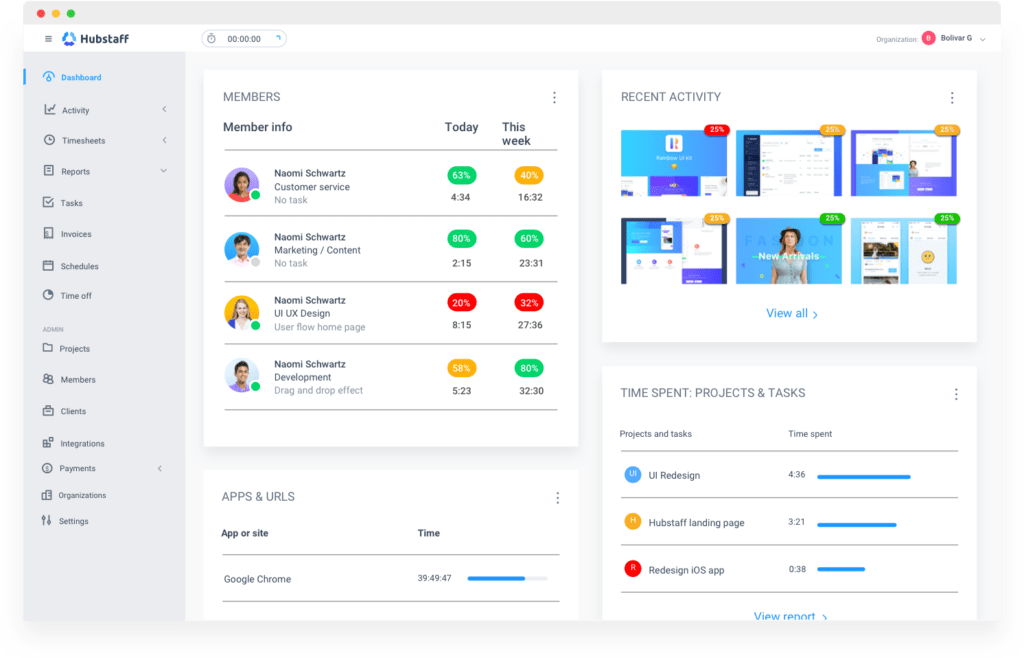Remote work is more popular than ever. Even though some businesses have returned to the office, flexible and fully remote teams are part of the new normal.
One good reason is that remote workers tend to be more productive than their in-office counterparts.
However, working from home doesn’t magically inspire your team to get more done.
People who have a great work ethic and crush their goals in the office are likely to succeed in their home office, too. But there are some challenges that make remote work a little different.
Whether you’re hiring new distributed team members or looking for ways to help your existing people upgrade their skills for remote work, this article talks about the vital work-from-home skills you should look for.
Boost your team’s efficiency with Hubstaff's productivity tools
Try it free for 14 daysWhy remote work skills matter
Often, hiring managers look for signs of a good work ethic and neglect the other skills that help remote teams succeed.
A person’s remote work ethic is the set of values and characteristics that enable them to productively work from home. We tend to think of work ethic as something you either have, or you don’t.
Actually, work ethic is just one of many core skills.
In a healthy work environment, each team member is responsible for her or his own task list. They need work ethic, independence, critical thinking skills, and a willingness to communicate in order to get the job done.
Without a well-rounded set of skills, your team will suffer productivity issues. Communication gaps can also cause issues with your remote culture.
Distributed teams don’t always spot remote skill gaps until they’ve cost thousands of dollars. Remote tools like Hubstaff can help you get ahead of those problems by creating more visibility in your remote team, but there’s no substitute for work ethic.
Leadership is vital to help your team develop their work from home skills
We can’t possibly cover everything in one blog post. Read on to learn how to develop a better work ethic in your team, and download our free Remote Management Ebook for even more resources to help you boost productivity and get more done.
The skills for remote work your team needs
There’s more to a strong work ethic than the willingness to perform tasks. It’s possible to waste time at work by focusing on the wrong things or getting bogged down with inefficient processes.
Your team members with these work-from-home skills are more likely to show a strong work ethic. Look for these characteristics in new hires.
If you want to improve your team’s work ethic, invest in your team and help them develop these remote work skills.
1. Great communication skills

A team member’s poor communication skills can slow down an entire team and result in missed deadlines and overdue projects.
All great remote workers have excellent communication skills and are able to communicate their thoughts and ideas effortlessly.
In a remote team, workers will do most of their communication through email and communication apps such as Slack. This makes it crucial that they’re good at expressing themselves in writing.
On top of that, your team members should get good at raising their hands and asking for or offering help.
When your team works from home, communication doesn’t happen by accident. Every time coworkers connect, someone has to reach out and make that happen.

Responsiveness is another important communication skill to build.
While remote work inevitably involves asynchronous communication, it’s still important that team members are able to respond to each other’s messages within a reasonable time frame.
For most remote teams, this means replying to emails and Slack messages within 24 hours of receiving them.
How to improve remote communication
You need to set the standard for how you want company communication to look like. In most cases, this will require improving your communication skills, which you can do by:
- Listening more and talking less – This is by far the easiest way to improve your communication skills. Simply focus on the other person and what they’re saying instead of thinking about what your next line is going to be.
- Paying attention to your body language – Body language is an integral part of communication. When talking to someone, you’ll want to make sure you’re not displaying negative body language by slouching, looking down, or keeping your hands in your pockets.
- Taking courses and reading books – There are plenty of courses and books on how to improve your communication skills. Take advantage of these to become a better communicator.
At Hubstaff, we use our Communication Manifesto to protect deep work time, encourage healthy collaboration, and set reasonable limits. You can get a copy of it here to use as a template.
2. The ability to work independently
People who are a great fit for remote work usually don’t need a lot of hand-holding on the job. These team members won’t email their supervisor a dozen times a day asking questions they could have answered themselves with the resources they already have.
They’re capable of working independently and figuring things out on their own. In fact, they prefer it.

How to increase independence in your team
If one person needs a lot of help to do their job, it’s probably something you need to address individually. If you notice that this is a trend across much of your team, you probably have some process issues to fix.
Start by making sure that everyone has access to the information they need.
Document all of your processes and use a task management system like Hubstaff Tasks to keep good records. For example, we use checklists and comments to keep track of progress so that it’s easier to hand off work to the next person.

For those individuals who need a little nudge in the right direction, get in the habit of answering their questions by explaining how they can answer it themself.
In other words, if someone asks you the correct way to respond to a customer’s question, direct them to the folder where you keep your support guides and tell them where to look to find that answer. Encourage them to bookmark important information so they can find it again.
Over time, your team will learn that they can and should find information and make decisions on their own.
One caveat — make sure that you empower your team to be independent. Kick your micromanagement tendencies and work on developing more transparency in your team.
3. Accountability
As a leader of a remote team, you don’t have time to check on everyone to make sure they’re doing what you asked them to.
You should be able to count on your team to do what they say, meet deadlines, and speak up if something doesn’t go as planned.
People with great remote work skills usually have the maturity to take responsibility for their own actions. They don’t shift blame to other people, instead focusing on how to move forward.
How to improve accountability
If you want to improve your employees’ accountability, you need to make sure to stay accountable yourself. Follow through on your promises and take responsibility when things don’t go the way you expect.
This is another place where task management software is especially useful. Assign tasks to specific people so that everyone knows who is responsible for what. Use automated workflows to make sure things get handed off smoothly.
Organizing your tasks wisely keeps things from slipping through the cracks. It also gives your team a convenient place to communicate if they need to make adjustments.
4. Excellent time management skills

Remote work often comes with flexible work hours.
People who were previously confined to specific work hours can have issues managing their time when they’re first allowed to have a flexible work schedule. Time can quickly get away from someone when they don’t need to work an eight-hour day, five days a week.
Great remote team members know how to manage their time effectively. They often use to-do lists and time tracking tools to keep themselves organized.
These top performers are mindful of work-life balance. Each week, they put in consistent hours without letting their work take over their home life. If they have too much to do and not enough time to do it, they let their teammates know so you can adjust workloads accordingly.
How to promote better time management
One of the most effective ways to improve time management in your company is to use a time tracking tool.
With a tool like Hubstaff, your team tracks time by task. That data shows your team and your managers exactly where work time goes. Your estimates will be more accurate because you can look at how long it took to do similar projects, and your team can see which tasks are starting to eat up more hours than expected.

You’ll probably always have more tasks on your to-do list than you have time to do. Prioritization is crucial for good time management. Help your team complete the right work in the right order by setting and communicating clear priorities.
You might also want to try out a time management technique in your team, such as Getting Things Done (GTD) or time blocking.
Different systems work for different people, so test a few and see what works best for your team.
5. Proactiveness
If you’re leading a remote team, you want to have as many proactive employees as possible.
These people don’t just take care of their main job responsibilities, but also look for ways to improve the company’s existing workflows and processes.
They’re happy to help out with a variety of tasks, even if those tasks are not a part of their core responsibilities.
Proactive team members are engaged employees that take the initiative instead of waiting for someone to tell them what to do.
How to encourage your team to be more proactive

Reward the behaviors you want to see. When team members come to you with an idea, thank them for speaking up and take their suggestions seriously.
It’s easy to criticize a new idea, especially if it’s different from what you were already working on. Resist that temptation. Team members will hesitate to try new things or make new suggestions if your immediate response is critical.
If you notice that nobody in your team is very proactive, you likely have a cultural issue.
Maybe you’ve been micromanaging and people don’t feel empowered.
Perhaps your policies reward people who stick to the status quo over those who create more work by sharing new ideas.
Take a look at your culture and remove the barriers that stop people from speaking up. Gradually, your team will feel more comfortable making decisions and offering their opinions.
Subscribe to the Hubstaff blog for more posts like this
Subscribe to the Hubstaff blog for more posts like this
6. Integrity
Strong ethical and moral principles should be the backbone of every business, guiding decision-making and interactions with coworkers and customers.
You should expect all your employees to have integrity. Integrity means that a person’s words, thoughts, and actions are in alignment. If they say they’ll do something, they do it. If they say they believe in a specific value, their actions prove it.
Hire people for remote work who have this quality.
People with integrity do their job to the best of their ability without trying to cut corners, lie, or cheat.
If you have a lack of integrity in your company, you may need to hire new team members to fix it. First, start by examining your company’s culture and values to see if the problem is systemic.
Define your company values

When you write down your company values, your employees understand what kind of behavior you expect from them.
As you communicate your values to your team, remember to give examples of the types of behavior that aren’t acceptable and define the consequences. Teach your managers how to address these issues. If you don’t enforce your policy, it won’t make any difference to your culture.
Most companies would benefit from striving to maintain the following values:
Honesty
Honesty helps to create a transparent work environment.
Encourage employees to speak their minds at all times. Train managers to provide useful, candid feedback that can help employees improve their performance.
If you haven’t worked in a transparent environment before, this value can be tough. Honesty isn’t always easy. However, it’s worth learning. Remember to share truths respectfully and clearly.
Trust
Trust is the basis of all interactions and relationships in a successful company. It improves collaboration and helps to create a healthier work environment.

There needs to be trust between the employer and their employees, as well as between customers and staff.
Developing trust is an ongoing process. You build trust slowly but lose it quickly.
In your values, define what trust means to you as a company and only make promises you know you will keep.
Ownership
Ownership is one of the most important values a company can have. It implies employees caring about the company and its goals as if they were the owner.
Ownership improves productivity and performance and can have a positive effect on job satisfaction and morale.
This is another value that takes time to build. Hire people who take pride in their work, no matter what it is, and empower your team to make decisions about their careers. It’s hard to take ownership when the boss makes all your choices for you.
Each of these values helps your team have more integrity because you have the opportunity to prove that they mean something to you. Make sure your actions back up your words.
Wrap up
A good remote work ethic is the best sign of an employee with great remote work skills. If your current employees are lacking in the work ethic department, use this guide to address specific issues before you blame a character flaw.
Remember to lead by example.
Show your team that work ethic is important by following through on your promises and living up to your company values.
Here’s one final reminder:
Work ethic does not mean working at all hours to prove your loyalty and commitment. That’s not a healthy way to run a team. As long as your team is living up to all of their commitments and doing great quality work, you can trust their remote work ethic.
Want more great advice to help you lead your remote team to success? Get our free ebook here.
This post was published in September 2013. It was updated in June 2021.
Most popular
How to Calculate a Raise: Practical Guide for Employers
By 2030, the US alone will lose $430 billion annually due to low talent retention — and a lot of this turnover stems from low pa...
How to Survive and Thrive in an 80-Hour Work Week
It’s hard to believe that only a century ago, the 80-hour work week was the norm in the United States. Then, in 1926, the Ford M...
Mastering Workforce Scheduling: Techniques and Tools for Success
Imagine a workday where scheduling your workforce effectively ensures that every shift is perfectly aligned with your business nee...
Top Time Trackers for Virtual Assistants: Enhance Efficiency and Accountability
Virtual assistants (VAs) have a lot of responsibilities — and so do the people who hire them. With so much to keep track of, a t...




